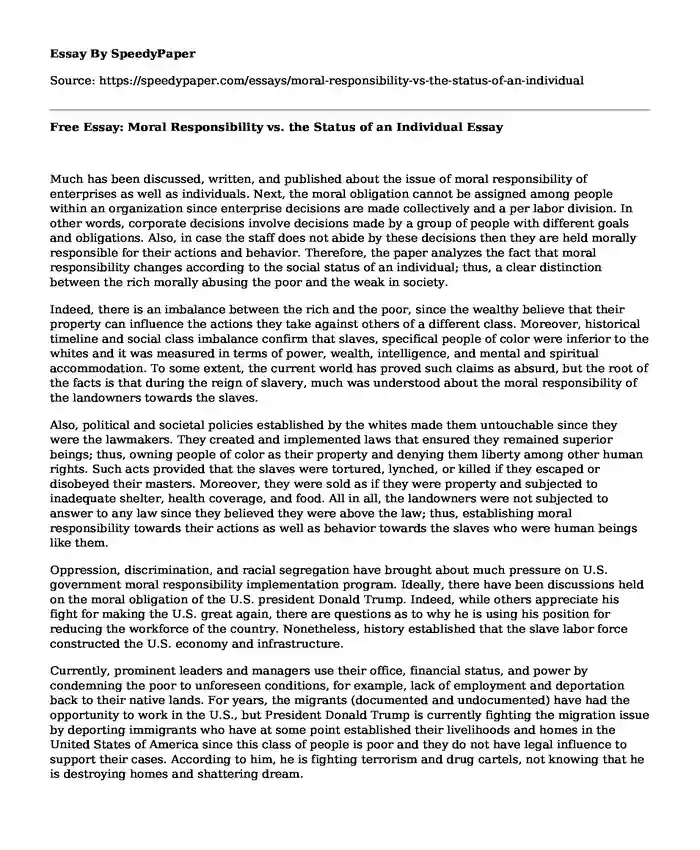Much has been discussed, written, and published about the issue of moral responsibility of enterprises as well as individuals. Next, the moral obligation cannot be assigned among people within an organization since enterprise decisions are made collectively and a per labor division. In other words, corporate decisions involve decisions made by a group of people with different goals and obligations. Also, in case the staff does not abide by these decisions then they are held morally responsible for their actions and behavior. Therefore, the paper analyzes the fact that moral responsibility changes according to the social status of an individual; thus, a clear distinction between the rich morally abusing the poor and the weak in society.
Indeed, there is an imbalance between the rich and the poor, since the wealthy believe that their property can influence the actions they take against others of a different class. Moreover, historical timeline and social class imbalance confirm that slaves, specifical people of color were inferior to the whites and it was measured in terms of power, wealth, intelligence, and mental and spiritual accommodation. To some extent, the current world has proved such claims as absurd, but the root of the facts is that during the reign of slavery, much was understood about the moral responsibility of the landowners towards the slaves.
Also, political and societal policies established by the whites made them untouchable since they were the lawmakers. They created and implemented laws that ensured they remained superior beings; thus, owning people of color as their property and denying them liberty among other human rights. Such acts provided that the slaves were tortured, lynched, or killed if they escaped or disobeyed their masters. Moreover, they were sold as if they were property and subjected to inadequate shelter, health coverage, and food. All in all, the landowners were not subjected to answer to any law since they believed they were above the law; thus, establishing moral responsibility towards their actions as well as behavior towards the slaves who were human beings like them.
Oppression, discrimination, and racial segregation have brought about much pressure on U.S. government moral responsibility implementation program. Ideally, there have been discussions held on the moral obligation of the U.S. president Donald Trump. Indeed, while others appreciate his fight for making the U.S. great again, there are questions as to why he is using his position for reducing the workforce of the country. Nonetheless, history established that the slave labor force constructed the U.S. economy and infrastructure.
Currently, prominent leaders and managers use their office, financial status, and power by condemning the poor to unforeseen conditions, for example, lack of employment and deportation back to their native lands. For years, the migrants (documented and undocumented) have had the opportunity to work in the U.S., but President Donald Trump is currently fighting the migration issue by deporting immigrants who have at some point established their livelihoods and homes in the United States of America since this class of people is poor and they do not have legal influence to support their cases. According to him, he is fighting terrorism and drug cartels, not knowing that he is destroying homes and shattering dream.
To conclude, moral responsibility is influenced by the social status of an individual, since the wealthy believe that their actions of oppression, discrimination, and inequality are above the law. Nevertheless, rich and mighty to oppress the poor due to the influence of power and wealth that makes them think they are above the law. These actions were established during the slavery era where the lives of the slaves were in the hands of the landowners. Next, such cases have been seen in Trump's actions and behavior of deporting the immigrants to their native nations; therefore, disrupting their livelihoods and breaking families. Indeed, social status alters the moral responsibility of an individual.
Cite this page
Free Essay: Moral Responsibility vs. the Status of an Individual. (2022, Nov 30). Retrieved from https://speedypaper.com/essays/moral-responsibility-vs-the-status-of-an-individual
Request Removal
If you are the original author of this essay and no longer wish to have it published on the SpeedyPaper website, please click below to request its removal:
- Network Protocols - Computer Science Essay Example
- Leadership Definition Essay Examples
- Free Essay on Zero-policy Ethics Policy
- Pregnant Women and Alcohol - Free Essay Sample
- The Abina and the Important Men - Book Review Essay Sample
- Free Essay Sample: The Obamacare Intervention and Its History
- Essay Sample on Religion and film- The Exorcist Movie
Popular categories





